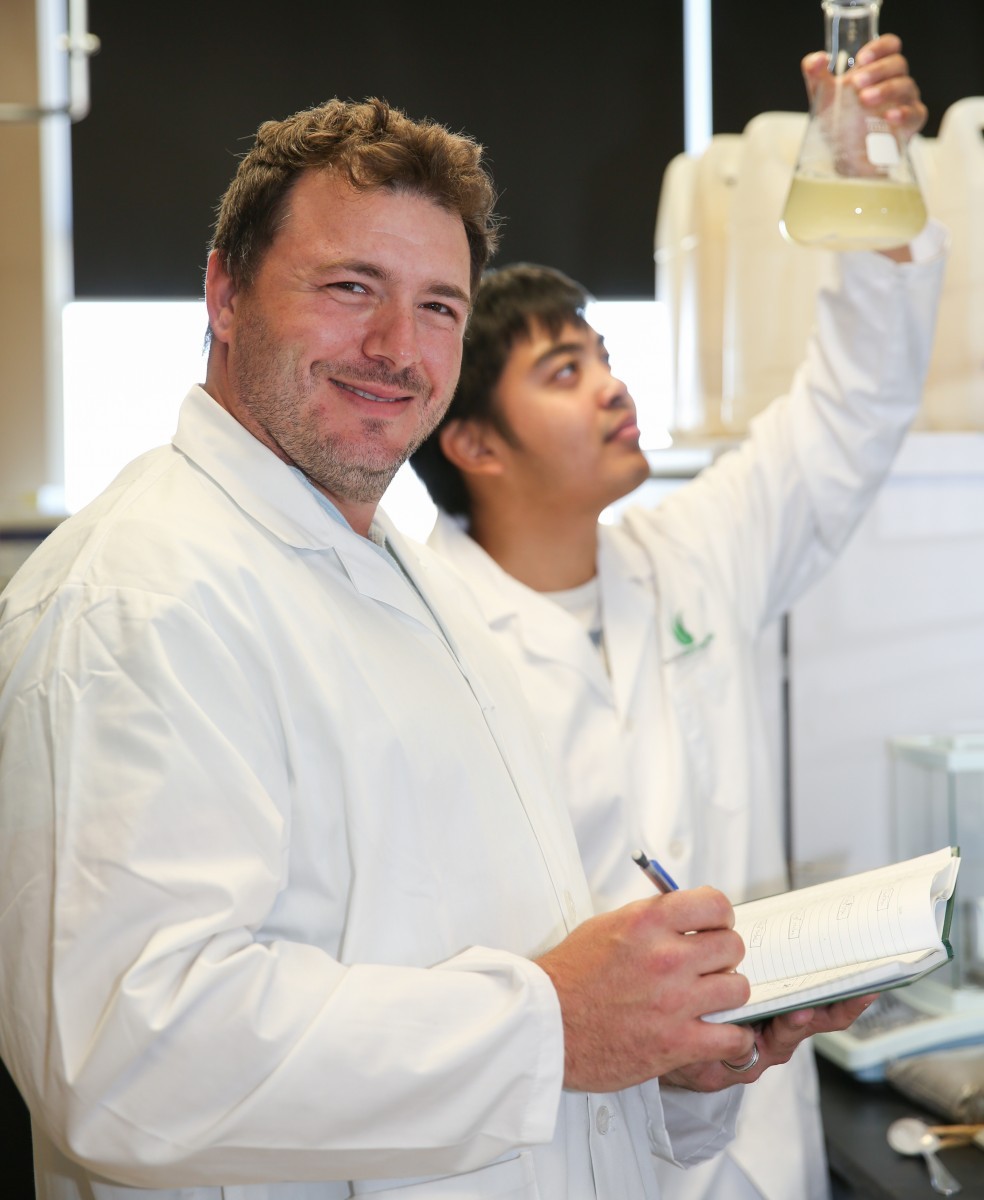
Dale Overton and Femi Ferreira, U of M Alumni. Photo courtesy of Mike Latschislaw
So what can you do with a science degree?
Meet science grad Dale Overton, Biology major [B.Sc.(MAJ)/05], Founder, Director of Overton Environmental Enterprises Inc.
Dale Overton is a rancher of sorts, one who works with a most unique livestock: Eisenia foetida and Eisenia hortensis. For those who don’t follow the world of worms, that’s the red wiggler and European nightcrawler.
It’s all part of his work at Overton Environmental Enterprises, the company he founded that specializes in soil amendment, organic fertilizers, environmental education and aquatic entomology.
At the company’s 7,800 square foot warehouse in Elmwood, millions of worms are being grown in stacked crates containing special bedding. Twenty pounds of writhing nightcrawlers live in each moist, musty-smelling container.
“Smells like healthy, good soil,” says Overton.
Overton loves his worms. He feeds them organic high-protein grains like sunflower meal and oats. He knows they are healthy when they are plump and reproducing frequently.
“When you’re raising worms, they’re like livestock, no different from cattle—they require food and maintenance,” says Overton. “Our worms eat better than we do.”
Overton mixes their feces, called worm castings, with compost, air and water to eventually create a liquefied microbial solution that can be sprayed on large swaths of land as biofertilizer.
“The idea is you can take a solid, really challenging product logistically and turn it into a liquid that you can apply to hundreds of acres,” he explains.
He sells this compost tea and other natural fertilizers to commercial, government and agricultural clients like golf clubs and farmers. All of Overton’s products and services involve sustainable landscaping techniques, including remediation and revegetation of contaminated or poor soil.
 “When I was doing my undergrad at the U of M, for some reason I really got interested in something called phyto-remediation when I was taking a course called plant stress physiology,” says Overton. “I really fell in love with how plants work, how they tolerate stress and how we can use them to clean up the environment.”
“When I was doing my undergrad at the U of M, for some reason I really got interested in something called phyto-remediation when I was taking a course called plant stress physiology,” says Overton. “I really fell in love with how plants work, how they tolerate stress and how we can use them to clean up the environment.”
For his master’s thesis, Overton spent three years studying how mine tailings have affected plant growth at the long abandoned Gunnar Mine in east Manitoba. It’s during this time that a friend mentioned how he knew someone who stockpiled castings in his back yard as a by-product of growing worms for fish bait. Overton was curious; the idea of acquiring those castings to sell as fertilizer interested him, but he was skeptical as to whether the business could be profitable.
He began researching worm castings and soil microbes and also came across the idea of producing compost tea. Then, just as he was two chapters shy of completing his thesis, he secured a $60,000 contract to do freelance taxonomy work. The opportunity convinced him to make a bold move.
“I ultimately shed a few tears and made the choice to put the masters on permanent hiatus, which hurt,” says Overton. “My heart and soul were in that project. But that contract I got has yielded me over the course of six years hundreds of thousands of dollars.”
He eventually expanded to offering compost and organic fertilizers, and his first big fertilizer client was Clear Lake Golf Course. Overton was interested in proving his custom-designed compost tea would improve their greens, so he made regular trips through-out the golf season to ensure the golf course received fresh compost tea. The grass ended up healthier with stronger roots, and he now supplies fertilizer to 70 golf courses across the country, employs eight people and even sells his own compost bioreactors.
One of his most important partners is JR Simplot, the largest supplier of French fries to North American outlets of McDonald’s. Overton is working with the food processor’s environmental manager, Femi Ferreira, to figure out ways to best deal with large amounts of potato waste from the company’s Portage La Prairie processing plant. He wants to use the waste in his composts and to produce biodiesel to run the company’s vehicles.
“I think they produce something like 60,000 pounds of potato waste every day and then they produce another 60,000 pounds of dirt when they wash the potatoes and the dirt comes off,” says Overton. “And that’s only one plant. They want to streamline their waste product.”
Overton recently completed a year-long pilot project in which JR Simplot’s organic potato waste was combined with other companies’ waste in a designated area of Steinbach’s landfill. Using these and other ingredients, Overton was able to produce a high-quality compost that he hopes to eventually sell.
“This is leading edge,” says Overton. “If it works, Simplot is going to look to do this across their entire food division. For Simplot, the risk is little; for us, the potential gain is massive.”
He’s also partnering with the U of M’s Richardson Centre for Functional Foods and Nutraceuticals to study the microbes present in the company’s worm castings, compost and compost tea. The research could provide further information on how to best combat plant disease and development issues.
“The worms have a plethora of beneficial microbes in their guts and on their surface, many of which are antibiotic producers,” says Overton. “Worms are basically a transit system for microbes in the soil.”
This, from someone fascinated by worms but who never thought he’d be raising them.
“It sounds crazy, but after this whole experience I have a deep love for worms in terms of what they can do and how they can help humanity,” says Overton.






